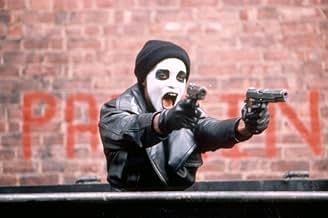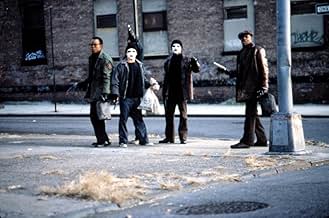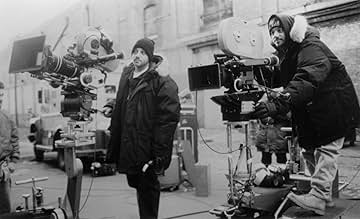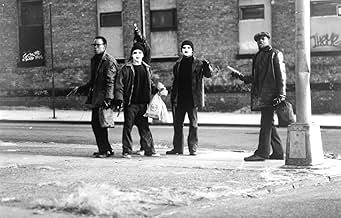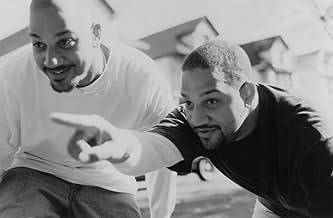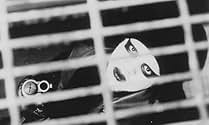IMDb रेटिंग
6.9/10
26 हज़ार
आपकी रेटिंग
अपनी भाषा में प्लॉट जोड़ेंA Vietnam vet adjusts to life after the war while trying to support his family, but the chance of a better life may involve crime and bloodshed.A Vietnam vet adjusts to life after the war while trying to support his family, but the chance of a better life may involve crime and bloodshed.A Vietnam vet adjusts to life after the war while trying to support his family, but the chance of a better life may involve crime and bloodshed.
- पुरस्कार
- 2 कुल नामांकन
Terrence Howard
- Cowboy
- (as Terrence Dashon Howard)
फ़ीचर्ड समीक्षाएं
Gripping, poignant story about a young black man growing up in the 1960s Bronx whose parents groom him to follow in the footsteps of his college grad older brother. He has his own plans however, and enlists in the Marine Corps where he survives four years of brutal warfare in Vietnam. He returns home to try and make a new life for himself, but a struggling economy and lack of formal education gradually draw him into a life of crime. An effective portrayal of black involvement in Vietnam, with good performances, powerful scenes, and shockingly graphic violence. Tate is commanding in the lead, and Tucker a real surprise as his drug-addicted pal. Not for all tastes, but well-crafted and well-made. ***
7d3ei
Chris Tucker is hilarious in this movie, he has great on screen charisma, and he speaks his lines very fluidly, as if he was improvising. Larenz Tate is great as well, being able to pull off the young version of his character, since he has a boyish face. And Bokeem Woodbine reminds me of Samuel L. Jackson in this movie. The cinematography is also great and so is the acting overall. Like everyone says, its not so much as a heist movie, but a reflection on the hardships of the black individual, such as finding work and drug abuse; after fighting a war that wasnt really meant for them or their country.
Albert and Allen Hughes direct, produce and co-write (with Michael Henry Brown) this tale about Anthony Curtis (Larenz Tate), a South Bronx boy who goes off to fight in Vietnam, to then return after his tours of duty to find things just aren't the same anymore. The follow up to their incendiary debut, Menace II Society, the Hughes brothers deliver another in your face picture that is quite frankly on a perpetual downer. This is no bad thing, though, as long as you are not looking to be cheered up.
That's Uncle Sam for you! Mean Green.
The pic very much harks back to the glory days of film noir in the 40s and 50s, where some talented film makers began to tell stories of returning war veterans finding what they left behind is now alien to them - with some characters, as is the case here - deeply scarred by their experiences. Add in some gangster elements and the coup de grâce that is the scintillating heist, and clearly the brothers have seen many an old classic film. That the narrative is tried and tested stops the piece hitting greater heights, this in spite of some super acting (especially Tate and the always value for money Keith David) and the hard hitting violence that pierces the senses. Predictable yet potent, and certainly memorable, it's well worth a look for the tough of mind and the classic era film of heart. 7/10
That's Uncle Sam for you! Mean Green.
The pic very much harks back to the glory days of film noir in the 40s and 50s, where some talented film makers began to tell stories of returning war veterans finding what they left behind is now alien to them - with some characters, as is the case here - deeply scarred by their experiences. Add in some gangster elements and the coup de grâce that is the scintillating heist, and clearly the brothers have seen many an old classic film. That the narrative is tried and tested stops the piece hitting greater heights, this in spite of some super acting (especially Tate and the always value for money Keith David) and the hard hitting violence that pierces the senses. Predictable yet potent, and certainly memorable, it's well worth a look for the tough of mind and the classic era film of heart. 7/10
The Hughes Brothers tried to play up the same angle with "Dead Presidents" as Micheal Cimino and Louis Garfinkle did with "The Deer Hunter" by portraying the social effects that the Vietnam war had on its young veterans. And for a while, it seemed as though they were quite successful. But in the end, it became apparent why "The Dead Presidents" fell short of the Academy recognition that "The Deer Hunter" won.
Set in the late 60s and early 70s, the plotline of "Dead Presidents" follows a promising and popular inner-city high school graduate, Anthony Curtis (Larenz Tate), who decides to forego college and enter the Vietnam War as a member of the Marine Corps. Anthony survives a graphic and arduous three-plus-year stint in the jungle, but upon his homecoming, he realizes that the "real world" can be just as trying as war. His low-paying job provides little support for his new family and he becomes desperate to make ends meet. He enlists the help of some old friends and plans a daring armored car heist which, if successful, could serve to amend his past and brighten his future...
The first seventy-five minutes of this movie were really well done. Character traits and relationships were well-established and the mood was properly set as suspense built for the anticipated war scenes--a perfect "epic-caliber" introduction.
But instead of continuing with a detailed flow, the directing crew tried to cram about ninety minutes worth of material into the final forty-five minutes, and consequently did not leave themselves enough time to totally develop any strong climactic progression or aptly characterize any of the cast members into their sudden postwar "criminal complex." Thus, the "heist scene," which based on advertising was probably supposed to be one of the more memorable and authoritative parts of the film, seemed to be almost too "spur-of-the-moment" and lacked motivation and definition.
All in all, the film's running time, which was approximately 119 minutes, was simply far too short for the storyline. The postwar segment of the film (the last forty-five minutes) was indeed key in separating a decent movie like "Dead Presidents" from a epic masterpiece like "The Deer Hunter."
Besides the first seventy-five minutes, a couple of notably good performances given by Chris Tucker as Skip (Anthony's best friend) and Rose Jackson as Juanita (Anthony's girlfriend) do make "Dead Presidents" a movie worth seeing at least once. That said, I would warn not to create a preconception based on the title, tagline or any publicity images that you might have seen, because they apply only to a small portion of the action.
Set in the late 60s and early 70s, the plotline of "Dead Presidents" follows a promising and popular inner-city high school graduate, Anthony Curtis (Larenz Tate), who decides to forego college and enter the Vietnam War as a member of the Marine Corps. Anthony survives a graphic and arduous three-plus-year stint in the jungle, but upon his homecoming, he realizes that the "real world" can be just as trying as war. His low-paying job provides little support for his new family and he becomes desperate to make ends meet. He enlists the help of some old friends and plans a daring armored car heist which, if successful, could serve to amend his past and brighten his future...
The first seventy-five minutes of this movie were really well done. Character traits and relationships were well-established and the mood was properly set as suspense built for the anticipated war scenes--a perfect "epic-caliber" introduction.
But instead of continuing with a detailed flow, the directing crew tried to cram about ninety minutes worth of material into the final forty-five minutes, and consequently did not leave themselves enough time to totally develop any strong climactic progression or aptly characterize any of the cast members into their sudden postwar "criminal complex." Thus, the "heist scene," which based on advertising was probably supposed to be one of the more memorable and authoritative parts of the film, seemed to be almost too "spur-of-the-moment" and lacked motivation and definition.
All in all, the film's running time, which was approximately 119 minutes, was simply far too short for the storyline. The postwar segment of the film (the last forty-five minutes) was indeed key in separating a decent movie like "Dead Presidents" from a epic masterpiece like "The Deer Hunter."
Besides the first seventy-five minutes, a couple of notably good performances given by Chris Tucker as Skip (Anthony's best friend) and Rose Jackson as Juanita (Anthony's girlfriend) do make "Dead Presidents" a movie worth seeing at least once. That said, I would warn not to create a preconception based on the title, tagline or any publicity images that you might have seen, because they apply only to a small portion of the action.
Dead Presidents hammers home its point in its final scene, a quite brilliant and excruciating in its execution scene in the sense we may want these characters to get away with what they're doing. The scene is a heist, created between a handful of people who have come to know each other through the years and we have come to understand their predicaments. The finale sums up the sad, sad desperation some of the characters have had to resort to given their life and what has happened to them and captures how hard the times get when they get hard in the first place.
Dead Presidents is a crime drama; a social commentary and a war film all wrapped up in one. But this genre hybridity does not work against the film as much as it does compliment the epic feeling that we get when we recognise these characters have covered quite a fair distance. The film is Boyz in the Hood; Taxi Driver; Platoon and finishes it all off with a shoot out alá shortly after the robbery in Michael Mann's 1995 film 'Heat'. The finale stands out due to its jarring slow motion and attention to detail in how they have to go about their plan in brutal, violent, realistic detail each person is positioned and attacks a victim with a certain weapon in a certain way and focuses on a certain part of the victim. The shootout stands out due to its inclusion in what has been, so far, a film that avoids massive shoot outs and lashings of violence in a steady and careful study of an African-America man in a crisis.
The study behind Dead Presidents is intriguing and it's a study of maturity and coming to terms with responsibility. The film has its characters eventually resort to particularly desperate measures in order to merely live but does a good job in not glamorising these means. The primary focus here is the character of Anthony Curtis (Tate), a young African-American in the late sixties hanging around with his other young friends Jose (Rodríguez) and Skip (Tucker) all of whom are about to finish their education and hopefully enter some sort of employment. The setting up of the film is unspectacular but deliberately so; the kids hang out, get high and attend parties. But it is two things that click lead Anthony into his coming of age tale; they are the impregnation of Juanita (Jackson) and the volunteering to go to Vietnam to fight the cause for America in the war.
These two events will shape the character upon his arrival back to The States and it's through the pathetic, immature activities that occur at the very beginning that we will get a feel for how far Anthony has come along as a human being when the going really gets tough later on before, as I said, desperation kicks in. These tough times revolve around balancing a family that he has created as well as dealing with his Vietnam experiences in which he witnessed all the atrocities you'd associate with the war.
The film's opening third is teasing just as it is entertaining. It threatens to head down a route of crime complete with African-American gangsters hanging out in pool halls, taking rides with one another and getting into scraps; be it with one another over a hustle or Kirby (David), perhaps the fiercest criminal of this opening third, battering someone of a third party nature with his prosthetic leg because they owe him money. But the film never becomes stonewall in its genre and doesn't resort to clichés. It presents Anthony with a series of choices at a delicate time in his life but they are little choices such as 'Does he take the potentially ominous ride with Kirby into the unknown?' as Kirby goes to settle a score and how does he react to first seeing a gun and the potential danger that could spawn.
These are choices and scenarios that will prepare Anthony for larger, more important decisions. The scenes and scenarios are nothing we haven't seen before in the respective genre but they're still required for Anthony's maturing process. Once in the military, the film again threatens to break into genre and Anthony is faced once again with choices to do with whether he excepts the Euthanasia plea from a dying soldier guns and death and general darkness remain in his life and are the subject of a lot of his life experiences. But it's when Anthony returns to New York that a study kicks in. As a character, he has matured through experience and cannot seem to get on with his girlfriend Juanita who's now a mother after his tours of duty. The film feeds off Vietnam as a war which disables its lone individual from re-fitting into society in the snug, immature manner in which he could prior to the event.
Dead Presidents contains a fair number of good scenes and its reference to Taxi Driver as a study of America more observant and concerned with what's going on in a small, Asian country many miles away when home and its own people are in an equally nasty mess (New York, yet again) is interesting. Anthony's struggles with employment and family life as well as the pimp that helps out with money and just wants to be friends acts as a highlight that he cannot even get re-acquainted all too easily, no matter how criminally minded the person is and no matter how much they might have had in common had they met prior one of them going off and fighting for one's country.
Dead Presidents is a crime drama; a social commentary and a war film all wrapped up in one. But this genre hybridity does not work against the film as much as it does compliment the epic feeling that we get when we recognise these characters have covered quite a fair distance. The film is Boyz in the Hood; Taxi Driver; Platoon and finishes it all off with a shoot out alá shortly after the robbery in Michael Mann's 1995 film 'Heat'. The finale stands out due to its jarring slow motion and attention to detail in how they have to go about their plan in brutal, violent, realistic detail each person is positioned and attacks a victim with a certain weapon in a certain way and focuses on a certain part of the victim. The shootout stands out due to its inclusion in what has been, so far, a film that avoids massive shoot outs and lashings of violence in a steady and careful study of an African-America man in a crisis.
The study behind Dead Presidents is intriguing and it's a study of maturity and coming to terms with responsibility. The film has its characters eventually resort to particularly desperate measures in order to merely live but does a good job in not glamorising these means. The primary focus here is the character of Anthony Curtis (Tate), a young African-American in the late sixties hanging around with his other young friends Jose (Rodríguez) and Skip (Tucker) all of whom are about to finish their education and hopefully enter some sort of employment. The setting up of the film is unspectacular but deliberately so; the kids hang out, get high and attend parties. But it is two things that click lead Anthony into his coming of age tale; they are the impregnation of Juanita (Jackson) and the volunteering to go to Vietnam to fight the cause for America in the war.
These two events will shape the character upon his arrival back to The States and it's through the pathetic, immature activities that occur at the very beginning that we will get a feel for how far Anthony has come along as a human being when the going really gets tough later on before, as I said, desperation kicks in. These tough times revolve around balancing a family that he has created as well as dealing with his Vietnam experiences in which he witnessed all the atrocities you'd associate with the war.
The film's opening third is teasing just as it is entertaining. It threatens to head down a route of crime complete with African-American gangsters hanging out in pool halls, taking rides with one another and getting into scraps; be it with one another over a hustle or Kirby (David), perhaps the fiercest criminal of this opening third, battering someone of a third party nature with his prosthetic leg because they owe him money. But the film never becomes stonewall in its genre and doesn't resort to clichés. It presents Anthony with a series of choices at a delicate time in his life but they are little choices such as 'Does he take the potentially ominous ride with Kirby into the unknown?' as Kirby goes to settle a score and how does he react to first seeing a gun and the potential danger that could spawn.
These are choices and scenarios that will prepare Anthony for larger, more important decisions. The scenes and scenarios are nothing we haven't seen before in the respective genre but they're still required for Anthony's maturing process. Once in the military, the film again threatens to break into genre and Anthony is faced once again with choices to do with whether he excepts the Euthanasia plea from a dying soldier guns and death and general darkness remain in his life and are the subject of a lot of his life experiences. But it's when Anthony returns to New York that a study kicks in. As a character, he has matured through experience and cannot seem to get on with his girlfriend Juanita who's now a mother after his tours of duty. The film feeds off Vietnam as a war which disables its lone individual from re-fitting into society in the snug, immature manner in which he could prior to the event.
Dead Presidents contains a fair number of good scenes and its reference to Taxi Driver as a study of America more observant and concerned with what's going on in a small, Asian country many miles away when home and its own people are in an equally nasty mess (New York, yet again) is interesting. Anthony's struggles with employment and family life as well as the pimp that helps out with money and just wants to be friends acts as a highlight that he cannot even get re-acquainted all too easily, no matter how criminally minded the person is and no matter how much they might have had in common had they met prior one of them going off and fighting for one's country.
क्या आपको पता है
- ट्रिवियाAll police officers depicted in this movie are from the fictional 53rd Precinct, the setting for Car 54, Where Are You? (1961) and Baretta (1975).
- गूफ़In the scene where Skip dies in his apartment, you can see him still breathing on the chair.
- इसके अलावा अन्य वर्जनCriterion laserdisc version includes additional scenes originally deleted before the theatrical release.
- साउंडट्रैकI Was Made To Love Her
Written by Lula Mae Hardaway, Stevie Wonder, Henry Cosby & Sylvia Moy
Performed by Stevie Wonder
Courtesy of Motown Record Company, L.P.
By Arrangement With Polygram Special Markets
टॉप पसंद
रेटिंग देने के लिए साइन-इन करें और वैयक्तिकृत सुझावों के लिए वॉचलिस्ट करें
- How long is Dead Presidents?Alexa द्वारा संचालित
- What are the differences between the R-Rated Ending and the Laserdisc Ending by Criterion?
विवरण
बॉक्स ऑफ़िस
- बजट
- $1,00,00,000(अनुमानित)
- US और कनाडा में सकल
- $2,41,47,179
- US और कनाडा में पहले सप्ताह में कुल कमाई
- $79,43,778
- 8 अक्टू॰ 1995
- दुनिया भर में सकल
- $2,41,47,179
- चलने की अवधि1 घंटा 59 मिनट
- ध्वनि मिश्रण
- पक्ष अनुपात
- 2.35 : 1
इस पेज में योगदान दें
किसी बदलाव का सुझाव दें या अनुपलब्ध कॉन्टेंट जोड़ें



